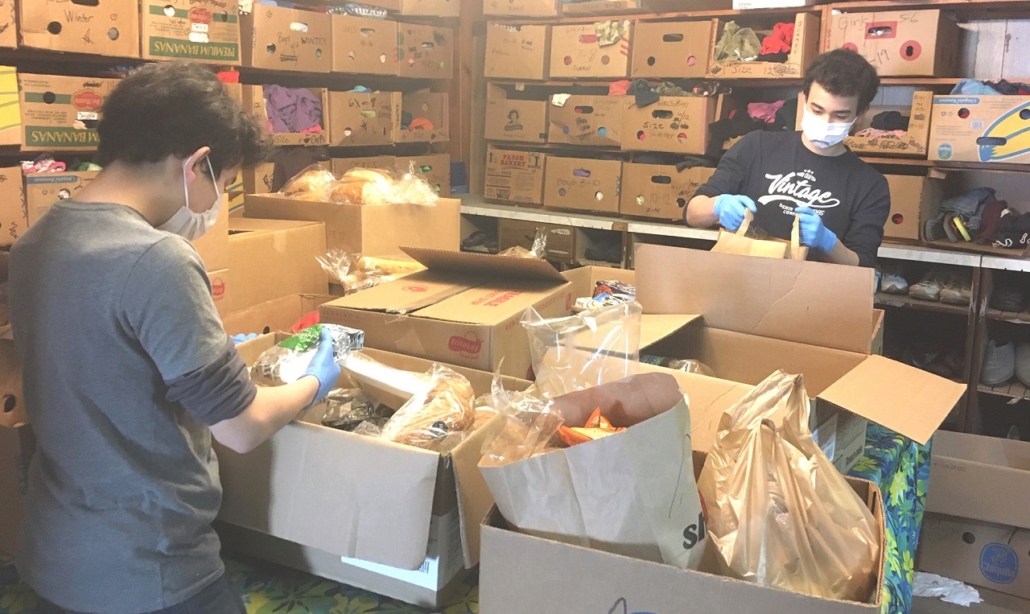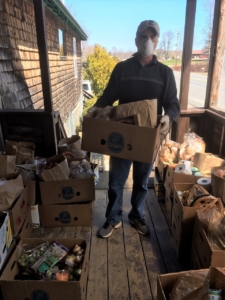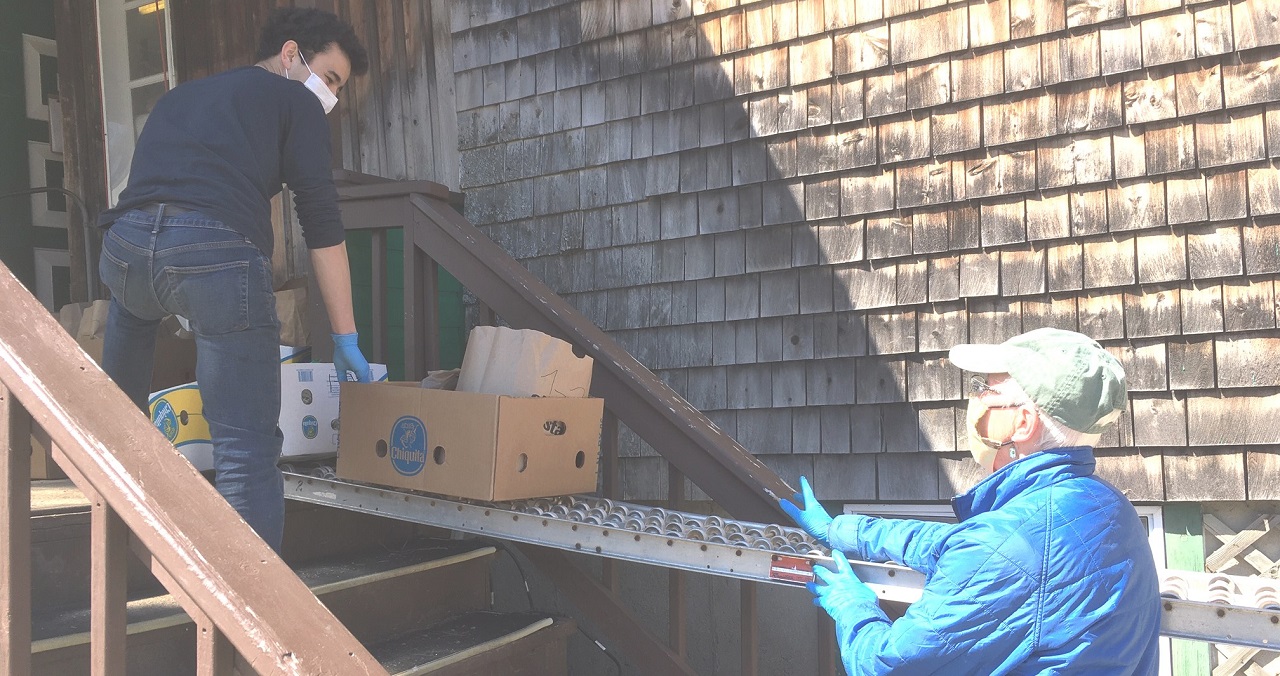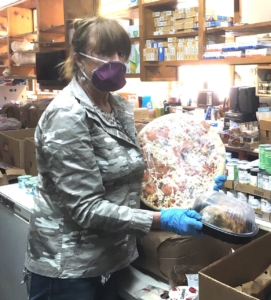Despite fewer volunteers, longer hours, local food pantries soldier on

Volunteers Captain Gombojav, left, and Lucas Gombojav, right, prepare food boxes before the opening at China Community Food Pantry. (photo by Ann Austin)
by Eric W. Austin
Pervasive in my discussions with local food pantries is a sense of profound gratefulness.
“We have been receiving monetary and food donations from many residents,” says Vassalboro Food Station director Cindy Ferland. “The community support has been tremendous.”

Volunteer Dale Peabody sets up food boxes on the front porch of China Community Food Pantry. (photo by Ann Austin)
Food pantries in China, Winslow, Albion and Palermo expressed similar sentiments.
“There are very generous and thoughtful people in our community,” writes June Foshay, manager of Palermo’s food pantry, in an email response to my inquiry.
“It’s gratifying to receive so much community support,” says Ann Austin, director of China Community Food Pantry.
When Maine declared a state of emergency over the COVID-19 pandemic, local food pantries were on the front lines.
Winslow’s Community Cupboard was forced to move up their plans to launch because of the crisis. “Our intent was to open a local food pantry in September 2020,” assistant operations manager Anna Quattrucci recalls. “The onset of the COVID-19 pandemic hastened our journey along! We were encouraged by Good Shepherd Food Bank to accelerate our opening…and we did! Talk about hustle. We went from having no ready space, no food, and no organized plan, to being fully set up, stocked and ‘open for business’ in a few short weeks.”
Area food banks have scrambled to adjust to the new conditions created by the pandemic and have worked to help new clients suddenly in need because of the economic shutdown. “We have had families who have previously used food pantries to help with food insecurity,” says Quattrucci, “but have seen many for whom this is a first-ever experience due to job loss or non-essential business closings.”
The greatest challenge for local pantries has been the operational changes forced on them by the new social distancing safety rules.
“We had to change our operating process [from] letting clients come in and select the food they wanted to pre-filling boxes to place in their cars as they drive by,” says Vassalboro’s Cindy Ferland.
Other pantries, like Albion’s Loaves and Fishes Food Pantry, have opted for a “minimal contact” approach by severely limiting how many people can enter the pantry. Manager Russ Hamm says it’s added significantly to the time it takes to serve everyone.
“We’re going to have to take a longer time to supply people with their food needs,” he says. “Rather than doing it in two hours, it looks like it may take three or four.”

Volunteers Lucas Gombojav, left, and Donna Loveland, right, demonstrate how food boxes are delivered to clients while maintaining social distancing at China Food Pantry. (photo by Ann Austin)
Like Vassalboro, the China Community Food Pantry has also shifted to a drive-thru format. The new procedures keep volunteers and clients separated and maintains social distancing, but since food boxes must be prepared in advance, it means more work for volunteers.
And that’s been a challenge, as many of the dedicated volunteers food pantries used to count on are now in high risk categories.
Albion’s Russ Hamm says, “I normally have a team of six women, and four or five men to carry the bags and boxes [of food] under normal circumstances.” Now, though, he’s down to just four people – and that includes himself.
Vassalboro’s Cindy Ferland relates a similar experience: “The pantry has many elderly volunteers that are much more vulnerable and understandably have decided to stay away from the pantry,” she says. “Fortunately, we have a few VCS teachers that have some time and are willing to step in and help our operation weekly.” She adds, “Our challenge is finding volunteers to go to stores to shop for the pantry, given the restricted access and limited products available in stores.”
China’s food pantry has been faced with a similar challenge. To comply with the new restrictions, they have focused on grouping volunteers in family units. “We have a husband and wife team that drives the van to pick up food,” says Ann Austin, pantry director, “and two boys from a local family do most of the heavy lifting.”
Once social distancing restrictions are lifted, pantries look forward to beefing up their volunteer base again. “When we eventually return to a ‘normal’ routine,” says Anna Quattrucci, of Winslow’s Community Cupboard, “we will expand our volunteer team, as many have asked to be part of the work.”
Even with longer hours and fewer volunteers, most pantries do not report feeling overwhelmed – yet. However, this could change if the current crisis stretches from weeks into months.
“Overall the pantry is seeing a slight decrease in people coming in,” says Vassalboro Food Station manager Cindy Ferland. “The mix [of people] has changed, with new people that are self-employed and out of work coming in as they are not yet eligible for unemployment relief benefits. There has been a decrease in clients that receive SNAP benefits. The combination of dramatically increased SNAP benefits and the federal economic relief payments apparently has lessened their need for supplemental food.”
Russ Hamm, director of Albion’s Loaves and Fishes Food Pantry, agrees. “As far as the amount of people — that has fluctuated remarkably, in the sense that we’re not seeing quite as many people as we normally would, and I have a suspicion that everybody got their stimulus check. I think that has made a little bit of difference.”
All of this is good news, and it’s the result of the amazing generosity shown by local communities in this time of crisis and the dedicated work of pantry volunteers. However, if current economic conditions continue in the downward direction of recent weeks, local food pantries could be facing a rough road ahead, and continued support of these important resources will be essential.
To see a list of local community food pantries, their hours of operation and contact information, please visit this page.
Eric W. Austin writes about local community issues and can be reached at ericaustin@townline.org.
Responsible journalism is hard work!
It is also expensive!
If you enjoy reading The Town Line and the good news we bring you each week, would you consider a donation to help us continue the work we’re doing?
The Town Line is a 501(c)(3) nonprofit private foundation, and all donations are tax deductible under the Internal Revenue Service code.
To help, please visit our online donation page or mail a check payable to The Town Line, PO Box 89, South China, ME 04358. Your contribution is appreciated!






Leave a Reply
Want to join the discussion?Feel free to contribute!